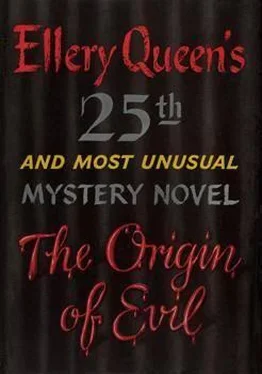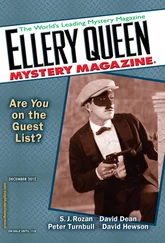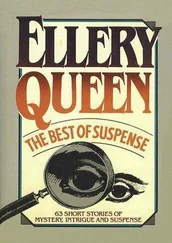“I don’t see that that would accomplish anything,” Keats was saying. “She’d only deny it. It wouldn’t prove a thing.”
“He’s lying, Keats.”
Wallace said with delicate mockery, “I’m happy to hear you take that attitude, Mr. Queen. Of course. I’m lying. May I go, Lieutenant?”
“No, Wallace.” Keats stuck his jaw out. “I’m not letting it get this far without knowing the whole story. You say you’ve been cuckolding Priam for almost a year now. Is Delia Priam in love with you?”
“I don’t think so,” said Wallace. “I think it’s the same thing with Delia that it is with me. A matter of convenience.”
“But it stopped some time ago, didn’t it?” Keats had a wink in his voice; man-to-man stuff. “It’s not still going on.”
“Certainly it’s still going on. Why should it have stopped?”
Keats’s shoulders bunched. “You must feel plenty proud of yourself, Wallace. Eating a man’s food, guzzling his liquor, taking his dough, and sleeping with his wife while he’s helpless in a wheelchair on the floor below. A cripple who couldn’t give you what you rate even if he knew what was going on.”
“Oh, didn’t I make that clear, Lieutenant?” said Alfred Wallace, smiling. “Priam does know what’s going on. In fact, looking back, I can see that he engineered the whole thing.”
“What are you giving me!”
“You gentlemen apparently don’t begin to understand the kind of man Priam is. And I think you ought to know the facts of life about Priam, since it’s his life you’re knocking yourselves out to save.”
Wallace ran his thumb tenderly around the brim of his hat. “I don’t deny that I didn’t figure Priam right myself in the beginning, when Delia and I first got together. I sneaked it, naturally. But Delia laughed and told me not to be a fool, that Priam knew, that he wanted it that way. Although he’d never admit it or let on ― to me, or to her.
“Well,” said Wallace modestly. “Of course I thought she was kidding me. But then I began to notice things. Looks in his eye. The way he kept pushing us together. That sort of thing. So I did a little investigating on the quiet.
“I found out that in picking secretaries Priam had always hired particularly virile-looking men.
“And I remembered the questions he asked me when I applied for the job ― how he kept looking me over, like a horse.” Wallace took a cigar from his pocket and lit it. Puffing with enjoyment, he leaned back. “Frankly, I’ve been too embarrassed to put the question to Delia directly. But unless I’m mistaken, and I don’t think I am, Priam’s secretaries have always done double duty. Well, for the last ten years, anyway. It also explains the rapid turnover. Not every man is as virile as he looks,” Wallace said with a laugh, “and then there are always some mushy-kneed lads who’d find a situation like that uncomfortable... But the fact remains. Priam’s hired men to serve not only the master of the house, you might say, but the mistress too.”
“Get him out of here,” Ellery said to Keats. But to his surprise no words came out.
“Roger Priam,” continued Alfred Wallace, waving his cigar, “is an exaggerated case of crudity, raw power, and frustration. The clue to his character ― and, gentlemen, I’ve had ample opportunity to judge it ― is his compulsive need to dominate everything and everyone around him. He tried to dominate old Leander Hill through the farce of pretending he, Roger Priam, was running a million-dollar business from a wheelchair at home. He tried to dominate Crowe Macgowan before Crowe got too big for him, according to Delia. And he’s always dominated Delia, who doesn’t care enough about anything to put up a scrap ― dominated her physically until he became paralyzed, Delia’s told me, with the most incredible vulgarities and brutalities.
“Now imagine,” murmured Wallace, “what paralysis from the waist down did to Priam’s need to dominate his woman. Physically he was no longer a man. And his wife was beautiful; to this day every male who meets her begins strutting like a bull. Priam knew, knowing Delia, that it was only a question of time before one of them made the grade. And then where would he be? He might not even know about it. It would be entirely out of his control. Unthinkable! So Priam worked out the solution in his warped way ― to dominate Delia by proxy.
“By God, imagine that! He deliberately picks a virile man ― the substitute for himself physically and psychologically ― and flings them at each other’s heads, letting nature take its course.”
Wallace flicked an ash into the tray on Keats’s desk. “I used to think he’d taken a leaf out of Faulkner’s Sanctuary, or Krafft-Ebing, except that I’ve come to doubt if he’s read a single book in forty-five years. No, Priam couldn’t explain all this ― to himself least of all. He’s an ignorant man; he wouldn’t even know the words. Like so many ignorant men, he’s a man of pure action. He throws his wife and hand-picked secretary together, thus performing the function of a husband vicariously, and by pretending to be deaf to what goes on with domestic regularity over his head he retains his mastery of the situation. He’s the god of the machine, gentlemen, and there is no other god but Roger Priam. That is, to Roger Priam.” Wallace blew a fat ring of cigar smoke and rose. “And now, unless there’s something else, Lieutenant, I’d like to salvage what’s left of my day off.”
Keats said in a loud voice, “Wallace, you’re a fork-tongued female of a mucking liar. I don’t believe one snicker of this dirty joke. And when I prove you’re a liar, Wallace, I’m going to leave my badge home with my wife and kids, and I’m going to haul you into some dark alley, and I’m going to kick the out of you.”
Wallace’s smile thinned. His face reassembled itself and looked suddenly old. He reached over Keats’s desk and picked up the telephone.
“Here,” he said, holding the phone out to the detective. “Or do you want me to get the number for you?”
“Scram.”
“But you want proof. Delia will admit it if you ask her in the right way, Lieutenant. Delia’s a very civilized woman.”
“Get out.”
Wallace laughed. He replaced the phone gently, adjusted his fashion-able hat on his handsome head, and walked out humming.
Keats insisted on driving Ellery home. The detective drove slowly through the five o’clock traffic.
Neither man said anything.
He had seen them for that moment in the Priam hallway, the day he had come at her summons to investigate the plague of dead frogs. Wallace had been standing close to her, far closer than a man stands to a woman unless he knows he will not be repulsed. And she had not repulsed him.
She had stood there accepting his pressure while Wallace squeezed her hand and whispered in her ear... He remembered one or two of Wallace’s glances at her, the glances of a man with a secret knowledge, glances of amused power... “/ always take the line of least resistance... He remembered the night she had hidden herself in his bedroom at the sound of her son’s and Laurel’s arrival. She had come to him that night for the purpose to which her life in the Priam house had accustomed her. Probably she had a prurient curiosity about “celebrities” or she was tired of Wallace. (And this was Wallace’s revenge?) He would have read the signs of the nymph easily enough if he had not mistaken her flabbiness for reserve―
“We’re here, Mr. Queen,” Keats was saying.
They were at the cottage.
“Oh. Thanks.” Ellery got out automatically. “Good night.”
Keats failed to drive away. Instead he said, “Isn’t that your phone ringing?”
Читать дальше












